初高中英语语法--情态动词
高中英语语法系列情态动词
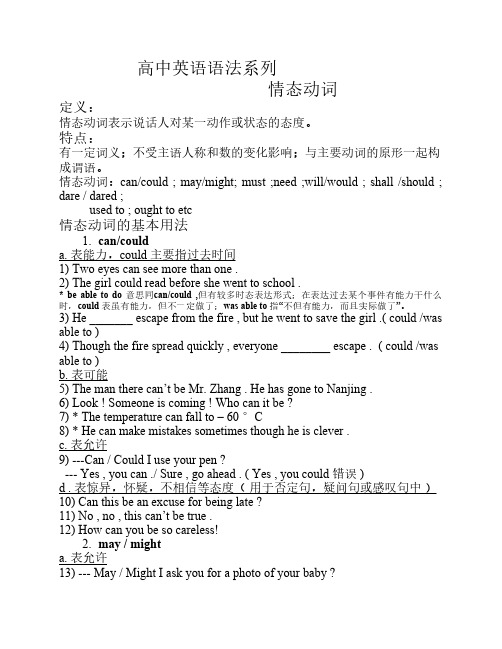
高中英语语法系列情态动词定义:情态动词表示说话人对某一动作或状态的态度。
特点:有一定词义;不受主语人称和数的变化影响;与主要动词的原形一起构成谓语。
情态动词:can/could ; may/might; must ;need ;will/would ; shall /should ; dare / dared ;used to ; ought to etc情态动词的基本用法1. can/coulda. 表能力,could 主要指过去时间1) Two eyes can see more than one .2) The girl could read before she went to school .* be able to do 意思同can/could ,但有较多时态表达形式;在表达过去某个事件有能力干什么时,could 表虽有能力,但不一定做了;was able to 指“不但有能力,而且实际做了”。
3) He _______ escape from the fire , but he went to save the girl .( could /was able to )4) Though the fire spread quickly , everyone ________ escape . ( could /was able to )b. 表可能5) The man there can’t be Mr. Zhang . He has gone to Nanjing .6) Look ! Someone is coming ! Who can it be ?7) * The temperature can fall to – 60 °C8) * He can make mistakes sometimes though he is clever .c. 表允许9) ---Can / Could I use your pen ?--- Yes , you can ./ Sure , go ahead . ( Yes , you could 错误 )d . 表惊异,怀疑,不相信等态度(用于否定句,疑问句或感叹句中)10) Can this be an excuse for being late ?11) No , no , this can’t be true .12) How can you be so careless!2. may / mighta. 表允许13) --- May / Might I ask you for a photo of your baby ?--- Yes , please . / Certainly ./ Please don’t ./ You’d better not ./ No , you mustn’t.b. 表可能,might 语气更加不肯定14) She may be at home .15) She might come to the party , but I am not sure .c .祝愿16) May you succeed !3 . musta . 表义务,意为“必须”,主观意志;而have to 为“不得不”,客观要求。
高中英语语法讲义-情态动词
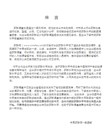
He may [might] be writing a letter. 他可能在写信。
They may [might] be going abroad next month. 他们可能在下个月出国。
③ 后接动词完成式,表示对过去可能发生的事进行推测:
另外,could还可与表示感知的动词(如see, hear, smell, taste, feel, understand等)连用表示的特定能力:
Looking down from the plane, we could see lights on the runway. 从飞机上向下看,我们可以看见机场跑道上的点点灯火。
2) 表示委婉的批评或责备:
You might have made greater progress. 你的进步本来可更大一些的。
You might at least have answered my letter. 你至少可以回我一封信嘛。
③ 表示“差点儿就要”:
I could have died laughing. 我差点儿笑死了。
二、may与might的用法
1. 表示允许
注意以下两种情况:
(1) 表示请求允许(即请求别人允许自己做某事),两者都可用,只是 might 表示的语气较委婉(但并不表示过去):
May [Might] I sit here? 我可以坐在这里吗?
1) 表示过去某事可能发生而实际上却并没发生:
A lot of men died who might have been saved.很多人本来可以获救的却死了。
It was really very dangerous. I might have killed myself. 那真的是太危险了,我差点没命了。
高中英语情态动词讲解
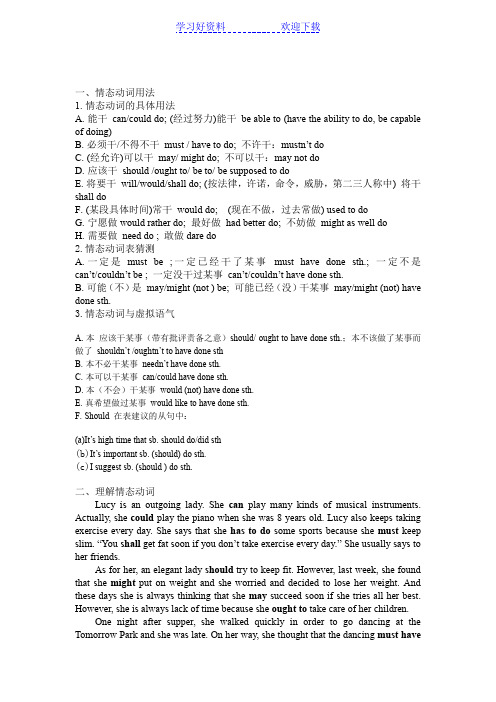
一、情态动词用法1.情态动词的具体用法A.能干can/could do; (经过努力)能干be able to (have the ability to do, be capable of doing)B.必须干/不得不干must / have to do; 不许干:mustn’t doC.(经允许)可以干may/ might do; 不可以干:may not doD.应该干should /ought to/ be to/ be supposed to doE.将要干will/would/shall do; (按法律,许诺,命令,威胁,第二三人称中) 将干shall doF.(某段具体时间)常干would do; (现在不做,过去常做) used to doG.宁愿做would rather do; 最好做had better do; 不妨做might as well doH.需要做need do ; 敢做dare do2.情态动词表猜测A.一定是must be ;一定已经干了某事must have done sth.; 一定不是can’t/couldn’t be ; 一定没干过某事can’t/couldn’t have done sth.B.可能(不)是may/might (not ) be; 可能已经(没)干某事may/might (not) have done sth.3.情态动词与虚拟语气A.本应该干某事(带有批评责备之意)should/ ought to have done sth.;本不该做了某事而做了shouldn’t /oughtn’t to have done sthB.本不必干某事needn’t have done sth.C.本可以干某事can/could have done sth.D.本(不会)干某事would (not) have done sth.E.真希望做过某事would like to have done sth.F.Should 在表建议的从句中:(a)It’s high time that sb. should do/did sth(b)It’s important sb. (should) do sth.(c)I suggest sb. (should ) do sth.二、理解情态动词Lucy is an outgoing lady. She can play many kinds of musical instruments. Actually, she could play the piano when she was 8 years old. Lucy also keeps taking exercise every day. She says that she has to do some sports because she must keep slim. “You shall get fat soon if you don’t take exercise every day.” She usually says to her friends.As for her, an elegant lady should try to keep fit. However, last week, she found that she might put on weight and she worried and decided to lose her weight. And these days she is always thinking that she may succeed soon if she tries all her best. However, she is always lack of time because she ought to take care of her children.One night after supper, she walked quickly in order to go dancing at the Tomorrow Park and she was late. On her way, she thought that the dancing must havebegun, and the coach could have taught or shown many new moves. She was afraid that her friends might have left before she got there. She was regretful then. She should have had supper earlier, or she could have taken a taxi, and indeed she needn’t have taken a bath in advance. When she reached the park finally, she found nobody was there. She remembered suddenly that it had been reported on the radio that there would be a heavy rain that night.思考每个加黑的情态动词的含义;什么时候用情态动词的完成式,分别表达什么意思。
情态动词高中知识点高三

情态动词高中知识点高三情态动词是一类具有特殊意义和用法的动词,它们在句子中一般与实义动词连用,表示说话人的推测、命令、请求、建议等情态。
在高中英语学习中,掌握情态动词的正确用法至关重要。
本文将介绍情态动词的相关知识点,帮助高三学生更好地运用这一语法现象。
一、情态动词的定义情态动词,又称情态助动词,是用来表示说话人对某种动作或状态的态度、推测、可能性、能力、意愿、义务等情态的一类特殊动词。
常见的情态动词包括can、could、may、might、must、shall、should、will、would等。
二、情态动词的用法1. 表示能力情态动词can表示某人具有能力或可能做某事,could用于过去说法。
例如:- She can speak three languages fluently.(她能说流利的三种语言)- He could lift the heavy boxes when he was younger.(他年轻时能搬起这些沉重的箱子)2. 表示推测和可能性情态动词may、might、could用于表示推测和可能性。
may用于表示较为肯定的推测,might和could表示推测的可能性较小。
例如:- The weather is cloudy, it may rain later.(天气多云,可能会下雨)- He might be late for the meeting.(他可能会迟到会议)3. 表示义务和建议情态动词must表示说话人对某种行为具有强烈的责任感或坚决要求,should表示建议。
例如:- We must obey the laws of the country.(我们必须遵守国家的法律)- You should apologize to your friend for your mistake.(你应该为你的错误向朋友道歉)4. 表示许可和请求情态动词can、may、could用于表示允许和请求。
高中英语语法专题情态动词与常考短语
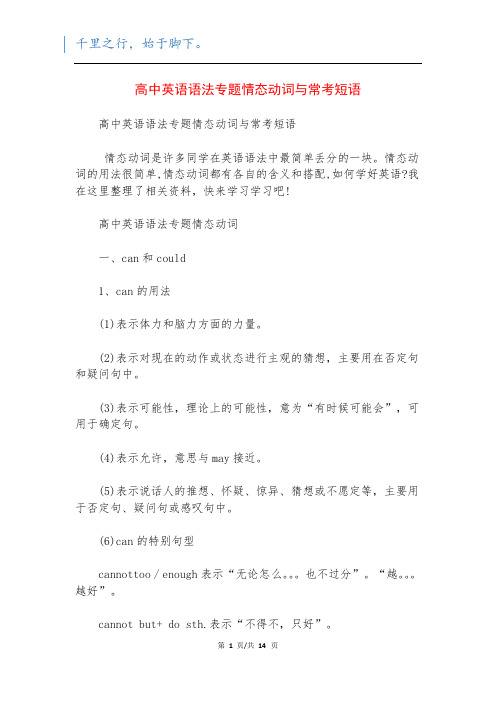
高中英语语法专题情态动词与常考短语高中英语语法专题情态动词与常考短语情态动词是许多同学在英语语法中最简单丢分的一块。
情态动词的用法很简单,情态动词都有各自的含义和搭配,如何学好英语?我在这里整理了相关资料,快来学习学习吧!高中英语语法专题情态动词一、can和could1、can的用法(1)表示体力和脑力方面的力量。
(2)表示对现在的动作或状态进行主观的猜想,主要用在否定句和疑问句中。
(3)表示可能性,理论上的可能性,意为“有时候可能会”,可用于确定句。
(4)表示允许,意思与may接近。
(5)表示说话人的推想、怀疑、惊异、猜想或不愿定等,主要用于否定句、疑问句或感叹句中。
(6)can的特别句型cannottoo / enough表示“无论怎么。
也不过分”。
“越。
越好”。
cannot but+ do sth.表示“不得不,只好”。
2、could的用法(1)表示力量,指的是过去时间。
(2)表示允许,指的是过去时间。
(3)表示可能,可以指过去时间,也可以指现在时间,表示语气缓和。
(4)委婉客气地提出问题或陈述看法,指的是现在时间。
主要用于疑问句,回答时用can。
3、can与could的区分can表推想时只用于否定句和疑问句(could无此限制)。
couldnt 的可能性比cant小。
4、can与be able to的区分(1)现在时:无区分,但后者不常用。
(2)完成时;can没有完成时,此时要用have(has,had)been able to。
(3)将来时:can没有将来时,要用will be able to。
(4)过去时:could表示一般力量,was/were able to 表示在详细场合通过努力胜利做成某事的力量。
二、may 和might1、may的用法(1)表示询问或说明一件事可不行以做。
(2)表示一件事或许会发生或某种状况可能会存在,通常用在确定句和否定句中。
留意:表示可能性时,cant语气强,表示“不行能”,may not 语气弱,表示“可能不”。
初中英语语法专题--情态动词

初中英语语法专题情态动词一、【情态动词】又叫情态助动词。
它们具有以下特点:⑴它们必须与其他动词连用,即:情态动词+动词原形表示说话人对所述动作的看法,如需要、可能、意愿或怀疑等。
⑵绝大多数情态动词没有人称和数的变化,即第三人称单数不加-s(以be和have 开头的情态动词短语除外)。
⑶在意义上,情态动词具有“多义性"。
例:can既可表示能力,又可表示可能、允许等意义。
有can (could), may (might), must, have to, shall (should, will (would),dare (dared), need (needed), ought to等。
情态动词无人称和数的变化;不能单独使用,必须与其后的动词原形构成谓语。
^^can 表示能力,意为“能会" 表示推测, 意为“可能",常用于否定句和疑问句中表示请求,允许,意为“可以”.^^could 是can 的过去式,意为“能、会”,表示过去的能力在疑问句中表示委婉请求 . ^^may 表示请求、许可,意为“可以" 表示推测,常用于肯定句中,意为“可能、也许".^^might 是may的过去式,表推测,常用于肯定句中,意为“可能、也许” .^^must 表示主观看法,意为“必须、应该”表有把握的推测,用语肯定句 .^^need \表示需要、必须,主要用于否定句和疑问句中。
^^dare 表示敢于,主要用于否定句和疑问句中.^^should 意为“应该”,表示要求和命令表示劝告、建议.^^had better 意为“最好”,表示建议.^^used to意为“过去常常,表示过去的动作、行为.部分情态动词的基本用法:考点一情态动词知识清单1. can的基本用法:⑴表示体力或智力上的能力,即“能够,会”,可与be able to转换。
例:He can speak English. = He is able to speak English。
高中英语知识点归纳情态动词和实义动词的用法

高中英语知识点归纳情态动词和实义动词的用法情态动词和实义动词是高中英语中常见的两类动词,它们具有不同的用法和含义。
下面将对情态动词和实义动词的用法进行归纳总结。
一、情态动词的用法情态动词是表示说话人的语气、态度、情感等方面的动词,常用的情态动词有can,could,may,might,must,shall,should,will,would等。
情态动词的用法如下:1. 表示能力和技能:- can 和 could 表示能力,主要用于肯定句和疑问句中。
- can 用于现在和将来时,could 用于过去时。
- She can swim.(她会游泳。
)- Could you play the guitar?(你会弹吉他吗?)2. 表示许可和禁止:- can 和 may 表示许可,可以用于肯定和疑问句中。
- cannot 和 must not 表示禁止。
- You can go now.(你现在可以走了。
)- May I use your phone?(我可以用一下你的手机吗?)- You must not smoke here.(你不能在这里抽烟。
)3. 表示推测和可能性:- may,might 和 could 表示可能性,可用于肯定和疑问句中。
- may 和 might 可用于现在和将来时,could 可用于过去时。
- He may come tomorrow.(他明天可能来。
)- Could it be true?(这可能是真的吗?)4. 表示义务和建议:- must 和 have to 表示义务,表示说话人的主观意愿。
- should 和 ought to 表示建议或期望。
- We must finish our homework.(我们必须完成作业。
)- You should see a doctor.(你应该去看医生。
)二、实义动词的用法实义动词是指具有实际意义的动词,用来表示具体的动作、状态或变化。
情态动词英语语法知识精讲
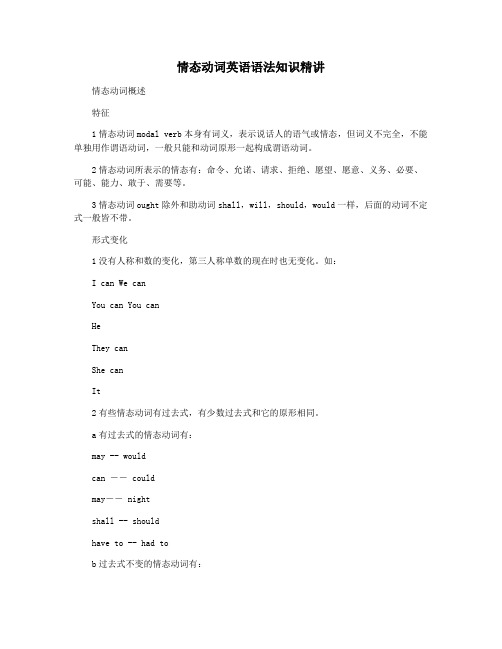
情态动词英语语法知识精讲情态动词概述特征1情态动词modal verb本身有词义,表示说话人的语气或情态,但词义不完全,不能单独用作谓语动词,一般只能和动词原形一起构成谓语动词。
2情态动词所表示的情态有:命令、允诺、请求、拒绝、愿望、愿意、义务、必要、可能、能力、敢于、需要等。
3情态动词ought除外和助动词shall,will,should,would一样,后面的动词不定式一般皆不带。
形式变化1没有人称和数的变化,第三人称单数的现在时也无变化。
如:I can We canYou can You canHeThey canShe canIt2有些情态动词有过去式,有少数过去式和它的原形相同。
a有过去式的情态动词有:may -- wouldcan ―― couldmay―― nightshall -- shouldhave to -- had tob过去式不变的情态动词有:must - must 或had toought to - ought toneed---needdare - dare亦可用dared3大多数情态动词后面可用动词的进行式、完成式和被动形式,如:canmay,mustbe doing,canmay,must have done,canmay,mustbe done等。
否定式情态动词和助动词一样,后面可直接跟否定词not。
现将情态动词的否定式及其否定式的简略式简略式用于口语中列举如下:shall not--shan't [FB:nt]will not---won't [wEunt]can not-can't [kB:nt]must not-mustn't [5mQsnt]should not-- shouldn'twould not-- wouldn'tcould not-- couldn'tdare not- daren't [dZEnt]need not-- needn't在疑问句中的用法情态动词在疑问句中的用法和助动词相同。
- 1、下载文档前请自行甄别文档内容的完整性,平台不提供额外的编辑、内容补充、找答案等附加服务。
- 2、"仅部分预览"的文档,不可在线预览部分如存在完整性等问题,可反馈申请退款(可完整预览的文档不适用该条件!)。
- 3、如文档侵犯您的权益,请联系客服反馈,我们会尽快为您处理(人工客服工作时间:9:00-18:30)。
He will be able to help us tomorrow.
Getting the job requires being able to speak Chinese. You should be able to buy a car soon.
It may / might / can / could rain later.
Must / should present or future Have to in all tenses I had to study for the test yesterday. I will have to find a new house soon.
I don’t have / don’t need to get up early today. I needn’t get up early today.
Must / have to / may / might / should / ought to / needn’t / will
You must take your medicine. You have to / need to take your medicine. You should take your medicine.
I could have done better. I should have tried harder. I shouldn’t have made that stupid mistakeght the shoes, but I didn’t have enough money.
Shall /May I help you?
The concert should / ought to / will start soon.
Modal + have + past participle
He can’t have studied.
Peter hasn’t arrived yet. He may / might / could have missed the bus.
May / Can / Might / Could I go out ?
Can / Could / Will / Would you help me with the bags, please?
It must be abandoned.
It can’t / couldn’t be inhabited.
Everything went fine. I needn’t have worried so much.
We needn’t have gone.
We didn’t have to go. We didn’t need to go.
(but we went)
(so we didn’t go)
You mustn’t/ can’t/ may not smoke in the hospital.
Present can – can’t Past could- couldn’t
He can play the violin.
He could write before he started school. But They were able to find the street although they didn’t have a map.
